Design decisions for buildings and communities are critical to efforts to increase local and regional resiliency. Building designers — of residential, institutional, and commercial structures — should strive to incorporate passive and active survivability concepts into new and renovated structures.
Community planners and developers need to incorporate concepts that increase the capacity to maintain transportation flow, strategies to handle water management, and infrastructure approaches that will withstand a variety of risks.
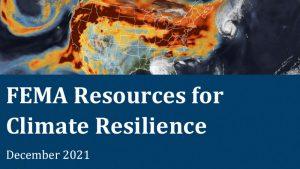
FEMA Resources for Climate Resilience
In December 2021 the Federal Emergency Management Agency (FEMA) published “FEMA Resources for Climate Resilience.” This publication provides a roadmap of FEMA programs and initiatives that advance community climate resilience. Building resilience is a long-term, ongoing process and this resource offers guidance for each step along the way – including funding opportunities, applicable FEMA programs, tools, and resources.
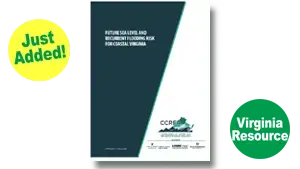
Future Sea Level and Recurrent Flooding Risk for Coastal Virginia
The report presents analysis of the best available existing data on coastal land elevation, sea level rise projections, vertical land motion (subsidence), and building and transportation assets.
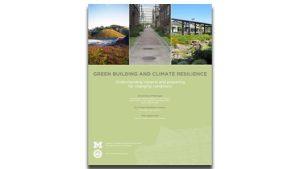
Green Building and Climate Resilience: Understanding Impacts and Preparing for Changing Conditions
This report from the University of Michigan and the U.S. Green Building Council (USGBC) includes regional impact information and building adaptation strategy. For the Southeast U.S. these include: sea-level rise; increased heat-related stresses for people, plants and animals; decreased water availability; and increased damage from higher intensity hurricanes and storm surges.
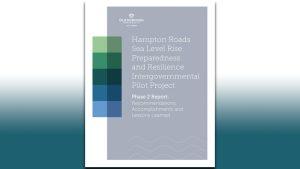
Hampton Roads Sea Level Rise Preparedness and Resilience Intergovernmental Pilot Project
After two years, the Hampton Roads Sea level Rise and Resilience Intergovernmental Planning Pilot Project (Intergovernmental Pilot Project or IPP), convened at Old Dominion University, has come to a successful close. The key deliverables include a whole of government mitigation and adaptation planning process and an integrated regional recommendation, both which can serve as a template for other regions.
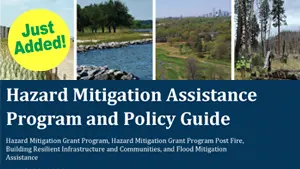
Hazard Mitigation Grant Program (HMGP)
FEMA’s Hazard Mitigation Grant Program provides funding to state, local, tribal and territorial governments so they can develop hazard mitigation plans and rebuild in a way that reduces, or mitigates, future disaster losses in their communities.
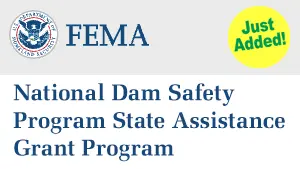
National Dam Safety Program (NDSP) State Assistance Grant Program
The National Dam Safety Program (NDSP) State Assistance Grant Awards provide assistance to encourage the establishment and maintenance of effective State programs intended to ensure dam safety, to protect human life and property, and to improve State dam safety programs.
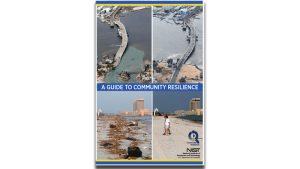
NIST Community Resilience Planning Guide for Buildings and Infrastructure Systems
The National Institute of Standards and Technology has produced two volumes of a Community Resilience Planning Guide for Buildings and Infrastructure Systems. The first volume spends time describing the methodology and provides a fictitious example of the planning process while the second volume provides reference chapters to Volume 1.

NIST’s Structural Performance for Multi-hazards Program
This National Institute of Standards and Technology’s (NIST) program enhances the robustness of structures by focusing primarily on cross-cutting research topics including prevention of disproportionate collapse and disaster and failure studies, along with the specific hazards of extreme winds and coastal inundation.
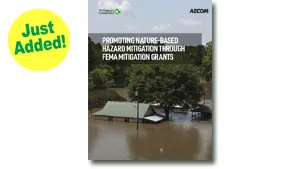
Promoting Nature-Based Hazard Mitigation Through FEMA Mitigation Grants
This guidance document is intended for stakeholders pursuing FEMA HMA grants for nature-based solutions to mitigate risks associated with flooding (riverine and coastal) and wildfire. Many of the HMA grant programs can fund projects that mitigate other hazards, but this document is limited in discussion to flooding and wildfire.

Rebuild by Design
Rebuild by Design was conceived as a HUD competition to respond to Superstorm Sandy’s devastation in the United States’ northeast region.

FEMA Resources for Climate Resilience
In December 2021 the Federal Emergency Management Agency (FEMA) published “FEMA Resources for Climate Resilience.” This publication provides a roadmap of FEMA programs and initiatives that advance community climate resilience. Building resilience is a long-term, ongoing process and this resource offers guidance for each step along the way – including funding opportunities, applicable FEMA programs, tools, and resources.

Future Sea Level and Recurrent Flooding Risk for Coastal Virginia
The report presents analysis of the best available existing data on coastal land elevation, sea level rise projections, vertical land motion (subsidence), and building and transportation assets.

Green Building and Climate Resilience: Understanding Impacts and Preparing for Changing Conditions
This report from the University of Michigan and the U.S. Green Building Council (USGBC) includes regional impact information and building adaptation strategy. For the Southeast U.S. these include: sea-level rise; increased heat-related stresses for people, plants and animals; decreased water availability; and increased damage from higher intensity hurricanes and storm surges.

Hampton Roads Sea Level Rise Preparedness and Resilience Intergovernmental Pilot Project
After two years, the Hampton Roads Sea level Rise and Resilience Intergovernmental Planning Pilot Project (Intergovernmental Pilot Project or IPP), convened at Old Dominion University, has come to a successful close. The key deliverables include a whole of government mitigation and adaptation planning process and an integrated regional recommendation, both which can serve as a template for other regions.

Hazard Mitigation Grant Program (HMGP)
FEMA’s Hazard Mitigation Grant Program provides funding to state, local, tribal and territorial governments so they can develop hazard mitigation plans and rebuild in a way that reduces, or mitigates, future disaster losses in their communities.

National Dam Safety Program (NDSP) State Assistance Grant Program
The National Dam Safety Program (NDSP) State Assistance Grant Awards provide assistance to encourage the establishment and maintenance of effective State programs intended to ensure dam safety, to protect human life and property, and to improve State dam safety programs.

NIST Community Resilience Planning Guide for Buildings and Infrastructure Systems
The National Institute of Standards and Technology has produced two volumes of a Community Resilience Planning Guide for Buildings and Infrastructure Systems. The first volume spends time describing the methodology and provides a fictitious example of the planning process while the second volume provides reference chapters to Volume 1.

NIST’s Structural Performance for Multi-hazards Program
This National Institute of Standards and Technology’s (NIST) program enhances the robustness of structures by focusing primarily on cross-cutting research topics including prevention of disproportionate collapse and disaster and failure studies, along with the specific hazards of extreme winds and coastal inundation.

Promoting Nature-Based Hazard Mitigation Through FEMA Mitigation Grants
This guidance document is intended for stakeholders pursuing FEMA HMA grants for nature-based solutions to mitigate risks associated with flooding (riverine and coastal) and wildfire. Many of the HMA grant programs can fund projects that mitigate other hazards, but this document is limited in discussion to flooding and wildfire.

Rebuild by Design
Rebuild by Design was conceived as a HUD competition to respond to Superstorm Sandy’s devastation in the United States’ northeast region.
